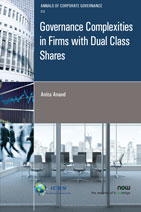Governance Complexities in Firms with Dual Class Shares
Anita Ansari, University of Toronto, Canada, anita.anand@utoronto.caAbstract
In a typical public company, shareholders can elect the board, appoint auditors, and approve fundamental changes. Firms with dual class share (DCS) structures alter this balance by inviting the subordinate shareholders to carry the financial risk of investing in the corporation without providing them with the corresponding power to elect the board or exercise other fundamental voting rights. This article fills a conspicuous gap in the scholarly literature by providing empirical data regarding the governance of DCS firms beyond the presence of sunrise and sunset provisions. The summary data suggest that the governance of DCS firms is variable. A large proportion of DCS firms have no majority of the minority voting provisions and no independent chair. By contrast, almost half of the DCS firms have a sunset clause and a majority of independent directors. Finally, just under one-third of DCS firms have change of control provisions over and above existing law. On the basis of this evidence, this article argues against complete private ordering in favor of limited reforms to protect shareholders in DCS firms including: mandatory sunset provisions, disclosure relating to shareholder votes, and buy out protections that would address weaknesses inherent in DCS firms.
Governance Complexities in Firms with Dual Class Shares
Governance Complexities in Firms with Dual Class Shares examines five governance characteristics of DCS firms and does so in the Canadian context where DCS have historically been more prevalent. It examines governance characteristics that are salient in debates about DCS and governance generally. This monograph also takes a broader look at the policy implications of continuing to respect private ordering as a means for regulating public corporations.
This full-fledged examination of DCS firms comes at an opportune moment; with controversy and potential regulatory reform on the agenda, the question persists as to how and whether regulators will respond. But before reform occurs, we should know more about DCS, including DCS governance. Section 2 provides background in terms of the DCS structures and the diametrically opposed views about DCS. Section 3 examines theoretical approaches that can be used when analyzing DCS firms including agency theory and principal cost analysis. Section 4 reviews divergences of findings in the empirical literature while Section 5 takes up two case studies of transactions in which DCS firms transformed their respective governance structures. Section 6 examines five governance characteristics against which DCS firms can be examined. Section 7 outlines the methodology and context while Section 8 sets forth data regarding DCS firm governance. The empirical analysis reveals that DCS firms generally do not voluntarily adopt governance provisions over and above existing law. Section 9 focuses on policy alternatives for regulatory reform prior to the conclusion in Section 10.
